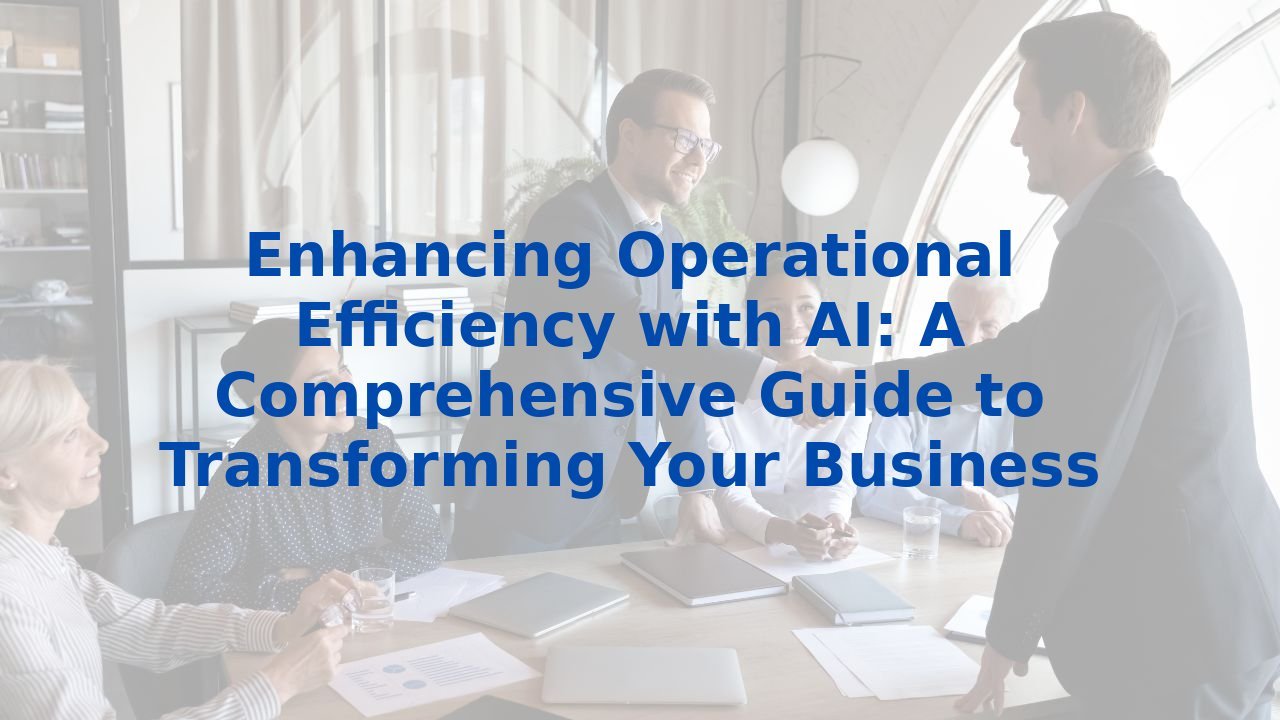Enhancing Operational Efficiency with AI: A Comprehensive Guide to Transforming Your Business
Enhancing Operational Efficiency with AI: A Comprehensive Guide to Transforming Your Business
Introduction
In an era marked by rapid technological advancements, businesses are consistently striving to refine their operational processes to stay ahead of the competition. At the forefront of this transformation is Artificial Intelligence (AI), a groundbreaking technology that promises not only to automate mundane tasks but also to enhance decision-making and streamline various business operations. This guide will explore how AI can breathe new life into operational efficiency and why training your workforce in these technologies is paramount for success.
Enhancing Operational Efficiency
The potential for AI to revolutionize operational efficiency is vast, impacting key areas such as supply chain management, data management, and customer service. Let's delve deeper into these areas:
- Supply Chain Management: AI's ability to analyze vast datasets in real time allows businesses to predict demand, optimize inventory levels, and refine logistics processes. This means businesses can proactively address inefficiencies before they escalate, ultimately leading to a more streamlined supply chain.
- Automation of Routine Tasks: Imagine a world where data entry, scheduling, and invoice processing occur without manual intervention. By automating these repetitive tasks, AI reduces error rates and accelerates processes, freeing up employees to tackle more strategic, high-value projects.
- Data Management: AI systems can significantly improve data management by automatically organizing and cleaning data from various sources. This fosters greater data accuracy and accessibility, enabling quicker, more informed decision-making.
Improving Decision-Making
Decision-making can often feel like navigating a maze. However, AI acts as a compass, providing swift and precise analyses of large datasets. This capability proves invaluable in marketing, where understanding consumer behavior can lead to effective campaigns. Similarly, in supply chain management, AI supports informed decisions on logistics and inventory control.
Enhancing Customer Experience
Customer experience is no longer a luxury but a necessity for businesses seeking loyalty. AI empowers organizations to personalize customer interactions by analyzing behavioral data and preferences. With these insights, companies can tailor recommendations and predict customer needs, fostering a deeper, more meaningful connection with their clients.
Cost Reduction and Resource Optimization
One of the standout features of AI is predictive maintenance, especially relevant for industrial operations. By anticipating equipment failures, AI reduces downtime and associated costs, ensuring resources are utilized to their fullest potential. For manufacturers, AI optimizes production schedules and resource allocation, ultimately minimizing waste and maximizing overall efficiency.
The Role of Generative AI
Generative AI represents a significant leap forward in operational efficiency. It automates repetitive tasks, simplifies content creation, and enhances overall productivity. Trained on extensive datasets, Generative AI can create varied outputs, from text to images, proving to be an invaluable asset across many sectors.
The Importance of Employee Training in AI
While implementing AI is crucial, the human element cannot be overlooked. Training employees to work alongside AI technologies enhances the effectiveness of these systems. Some benefits include:
- Skill Development: Equipping employees with AI competencies extends their productivity and boosts organizational efficiency.
- Adaptability: As AI evolves, a well-trained workforce will seamlessly transition to new technologies, paving the way for future innovations.
- Enhanced Decision-Making: Employees who understand AI can make better-informed decisions, tapping into AI’s insights to guide their strategies.
- Improved Customer Service: Familiarity with AI tools empowers employees to leverage these technologies, resulting in better customer experiences through tools like AI-driven chatbots.
Conclusion
The integration of AI into business processes promises numerous benefits, from refining decision-making and increasing operational efficiency to fostering innovative approaches and reducing costs. By embracing AI, organizations can streamline their operations and deliver enhanced customer experiences, paving the path for sustained growth.
However, the importance of empowering your workforce through AI training cannot be overstated. Investing in your team's skills ensures that your organization not only adapts to the changing landscape but also thrives within it. The future is here; will you seize the opportunity?



